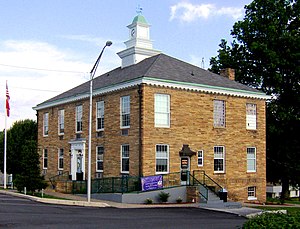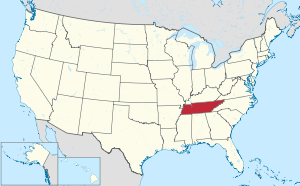Pickett County, Tennessee
Pickett County | |
|---|---|
 Pickett County Courthouse in Byrdstown | |
 Location within the U.S. state of Tennessee | |
 Tennessee's location within the U.S. | |
| Coordinates: 36°34′N 85°05′W / 36.56°N 85.08°W | |
| Country | |
| State | |
| Founded | 1879 |
| Named for | Howard L. Pickett, state legislator[1] |
| Seat | Byrdstown |
| Largest town | Byrdstown |
| Area | |
• Total | 174 sq mi (450 km2) |
| • Land | 163 sq mi (420 km2) |
| • Water | 12 sq mi (30 km2) 6.6% |
| Population (2020) | |
• Total | 5,001 |
| • Density | 31/sq mi (12/km2) |
| Time zone | UTC−6 (Central) |
| • Summer (DST) | UTC−5 (CDT) |
| Congressional district | 6th |
Pickett County is a county located in the U.S. state of Tennessee. As of the 2020 census, the population was 5,001, making it the least populous county in Tennessee.[2] Its county seat is Byrdstown.[3] The city of Byrdstown and the Kentucky town of Albany, 11 miles (18 km) to the northeast, are positioned between two Army Corps of Engineers lakes: Dale Hollow Lake, mainly in Tennessee, and Lake Cumberland, in Kentucky. The area is known as "Twin Lakes" and Byrdstown is noted as "The Gateway To Dale Hollow Lake". Every year thousands of people vacation at the many resorts situated along the lakes.
History
Pickett County was created in 1879 from sections of Overton and Fentress counties. It was named for Howell Lester Pickett (1847 - 1914), a member of the state legislature representing Wilson County who had been instrumental in the county's formation.[1] Nobel Peace Prize winner Cordell Hull had been born in one of the parcels of land set aside to create the new county. Hull would be honored for his role in organizing the World War II diplomatic alliance that became the United Nations.
Geography
According to the U.S. Census Bureau, the county has a total area of 174 square miles (450 km2), of which 163 square miles (420 km2) is land and 12 square miles (31 km2) (6.6%) is water.[4] It is the fourth-smallest county in Tennessee by land area and third-smallest by total area. The eastern part of the county, much of which is part of Pickett State Forest, lies atop the Cumberland Plateau, while the western, more populated half is located on the Highland Rim. The Wolf River and the Obey River, the lower parts of which are part of Dale Hollow Lake, pass through the county. The rivers converge just west of the county's border with Clay County.

Streams in the far eastern section of the county are part of the watershed of the Big South Fork of the Cumberland River.
Adjacent counties
- Wayne County, Kentucky (northeast/EST Border)
- Scott County (east/EST Border)
- Fentress County (southeast)
- Overton County (southwest)
- Clay County (west)
- Clinton County, Kentucky (north)
National protected area
- Big South Fork National River and Recreation Area (very small part)
State protected areas
- Cordell Hull Birthplace State Park
- Honey Creek State Natural Area
- Pickett State Forest (part)
- Pickett CCC Memorial State Park
- Twin Arches State Natural Area (part)
Highways
Demographics
| Census | Pop. | Note | %± |
|---|---|---|---|
| 1890 | 4,736 | — | |
| 1900 | 5,366 | 13.3% | |
| 1910 | 5,087 | −5.2% | |
| 1920 | 5,205 | 2.3% | |
| 1930 | 5,615 | 7.9% | |
| 1940 | 6,213 | 10.7% | |
| 1950 | 5,093 | −18.0% | |
| 1960 | 4,431 | −13.0% | |
| 1970 | 3,774 | −14.8% | |
| 1980 | 4,358 | 15.5% | |
| 1990 | 4,548 | 4.4% | |
| 2000 | 4,945 | 8.7% | |
| 2010 | 5,077 | 2.7% | |
| 2020 | 5,001 | −1.5% | |
| U.S. Decennial Census[5] 1790-1960[6] 1900-1990[7] 1990-2000[8] 2010-2020[9] 2020[2] | |||

2020 census
| Race | Number | Percentage |
|---|---|---|
| White (non-Hispanic) | 4,811 | 96.2% |
| Black or African American (non-Hispanic) | 8 | 0.16% |
| Native American | 8 | 0.16% |
| Asian | 15 | 0.3% |
| Pacific Islander | 1 | 0.02% |
| Other/Mixed | 75 | 1.5% |
| Hispanic or Latino | 83 | 1.66% |
As of the 2020 United States census, there were 5,001 people, 2,281 households, and 1,600 families residing in the county.
2000 census
As of the census[12] of 2000, there were 4,945 people, 2,091 households, and 1,461 families residing in the county. The population density was 30 people per square mile (12/km2). There were 2,956 housing units at an average density of 18 per square mile (7/km2). The racial makeup of the county was 99.15% White, 0.10% Black or African American, 0.16% Native American, 0.04% Asian, 0.10% from other races, and 0.44% from two or more races. 0.83% of the population were Hispanic or Latino of any race.
There were 2,091 households, out of which 27.40% had children under the age of 18 living with them, 58.30% were married couples living together, 7.80% had a female householder with no husband present, and 30.10% were non-families. 27.20% of all households were made up of individuals, and 12.90% had someone living alone who was 65 years of age or older. The average household size was 2.33 and the average family size was 2.83.
In the county, the population was spread out, with 21.40% under the age of 18, 8.60% from 18 to 24, 24.70% from 25 to 44, 27.70% from 45 to 64, and 17.80% who were 65 years of age or older. The median age was 42 years. For every 100 females there were 96.80 males. For every 100 females age 18 and over, there were 94.20 males.
The median income for a household in the county was $24,673, and the median income for a family was $31,355. Males had a median income of $22,367 versus $17,173 for females. The per capita income for the county was $14,681. About 12.00% of families and 15.60% of the population were below the poverty line, including 19.40% of those under age 18 and 20.00% of those age 65 or over.
Education
- Pickett County High School - High school
- Pickett County K-8 - Elementary school/Junior high school
Communities


Town
- Byrdstown (county seat)
Unincorporated communities
Ghost town
Politics
Along with Macon County, Pickett County constitutes an outlier in Tennessee politics as it is a historically Republican county in a region (Middle Tennessee) that was overwhelmingly Democratic up until recent years. Since its founding, Republicans have carried the county in every presidential election, with the only exceptions being Franklin D. Roosevelt in 1932, and Woodrow Wilson and Bill Clinton in the split 1912 and 1992 elections, respectively.
| Year | Republican | Democratic | Third party(ies) | |||
|---|---|---|---|---|---|---|
| No. | % | No. | % | No. | % | |
| 2020 | 2,381 | 81.24% | 525 | 17.91% | 25 | 0.85% |
| 2016 | 2,021 | 77.28% | 536 | 20.50% | 58 | 2.22% |
| 2012 | 1,712 | 69.79% | 712 | 29.03% | 29 | 1.18% |
| 2008 | 1,786 | 66.87% | 854 | 31.97% | 31 | 1.16% |
| 2004 | 1,600 | 60.49% | 1,033 | 39.05% | 12 | 0.45% |
| 2000 | 1,281 | 57.21% | 939 | 41.94% | 19 | 0.85% |
| 1996 | 1,046 | 50.51% | 901 | 43.51% | 124 | 5.99% |
| 1992 | 1,094 | 46.20% | 1,144 | 48.31% | 130 | 5.49% |
| 1988 | 1,118 | 63.67% | 634 | 36.10% | 4 | 0.23% |
| 1984 | 1,246 | 63.67% | 706 | 36.08% | 5 | 0.26% |
| 1980 | 1,319 | 62.75% | 758 | 36.06% | 25 | 1.19% |
| 1976 | 986 | 50.72% | 948 | 48.77% | 10 | 0.51% |
| 1972 | 957 | 72.23% | 357 | 26.94% | 11 | 0.83% |
| 1968 | 884 | 59.41% | 405 | 27.22% | 199 | 13.37% |
| 1964 | 935 | 56.22% | 728 | 43.78% | 0 | 0.00% |
| 1960 | 1,154 | 67.05% | 567 | 32.95% | 0 | 0.00% |
| 1956 | 985 | 63.30% | 560 | 35.99% | 11 | 0.71% |
| 1952 | 1,003 | 64.71% | 547 | 35.29% | 0 | 0.00% |
| 1948 | 849 | 59.08% | 566 | 39.39% | 22 | 1.53% |
| 1944 | 761 | 63.52% | 416 | 34.72% | 21 | 1.75% |
| 1940 | 830 | 55.63% | 652 | 43.70% | 10 | 0.67% |
| 1936 | 651 | 58.13% | 454 | 40.54% | 15 | 1.34% |
| 1932 | 681 | 48.09% | 712 | 50.28% | 23 | 1.62% |
| 1928 | 745 | 65.70% | 382 | 33.69% | 7 | 0.62% |
| 1924 | 676 | 51.06% | 643 | 48.56% | 5 | 0.38% |
| 1920 | 896 | 59.61% | 607 | 40.39% | 0 | 0.00% |
| 1916 | 501 | 54.52% | 418 | 45.48% | 0 | 0.00% |
| 1912 | 355 | 39.44% | 411 | 45.67% | 134 | 14.89% |
See also
References
- ^ a b Anne-Leslie Owens, "Pickett County," Tennessee Encyclopedia of History and Culture. Retrieved: 18 March 2013.
- ^ a b "2020 Census Data". data.census.gov.
- ^ "Find a County". National Association of Counties. Retrieved June 7, 2011.
- ^ "2010 Census Gazetteer Files". United States Census Bureau. August 22, 2012. Retrieved April 9, 2015.
- ^ "U.S. Decennial Census". United States Census Bureau. Retrieved April 9, 2015.
- ^ "Historical Census Browser". University of Virginia Library. Retrieved April 9, 2015.
- ^ Forstall, Richard L., ed. (March 27, 1995). "Population of Counties by Decennial Census: 1900 to 1990". United States Census Bureau. Retrieved April 9, 2015.
- ^ "Census 2000 PHC-T-4. Ranking Tables for Counties: 1990 and 2000" (PDF). United States Census Bureau. April 2, 2001. Archived (PDF) from the original on October 9, 2022. Retrieved April 9, 2015.
- ^ "State & County QuickFacts". United States Census Bureau. Archived from the original on June 7, 2011. Retrieved December 7, 2013.
- ^ Based on 2000 census data
- ^ "Explore Census Data". data.census.gov. Retrieved December 26, 2021.
- ^ "U.S. Census website". United States Census Bureau. Retrieved May 14, 2011.
- ^ Leip, David. "Dave Leip's Atlas of U.S. Presidential Elections". uselectionatlas.org. Retrieved March 12, 2018.
External links
- Pickett County Government — DaleHollow.com
- Pickett County, TNGenWeb - free genealogy resources for the county
- Template:Curlie

